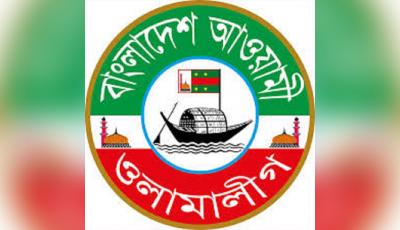 The Awami League is considering giving recognition to Olama League if all its groups and leaders unite. Then the organisation may be acknowledged as a fraternal body.
The Awami League is considering giving recognition to Olama League if all its groups and leaders unite. Then the organisation may be acknowledged as a fraternal body.
AL office secretary Abdus Sobhan Golap had meetings with all leaders and workers of Olama League.
After listening to various Olama League leaders, Golap asked them to be united.
The leaders of Olama League have persistently claimed to be among forces in favour of liberation and the ideals of Bangabandhu, upholding progressive values.
They assert that those who held sectarian values, or were radicals, are no longer with the Olama League. Dr Golap said: “If the prime minister agrees they may be helped to organise a conference.”
The Olama League was active in opposing BNP-Jamaat politics but after the AL came to power, its leaders criticised many 'controversial' statements.
On Jan 21, Olama League held a human rally in front of the National Press Club backing their 13-point demands, including a ban on BPL, the closure of all NGOs and a rejection of laws for the minorities.
On that day, a press statement given by Olama League said it had no relation with AL. The Olama League created a controversy in the past opposing the marriageable age for women, demanding the repeal of education law and passing of the death sentence for defaming religion.
On Apr 10, 2016, one section of Olama League termed observance of Pahela Baishakh as wrong and demanded an end to state patronage for the event.
On Saturday, general secretary of one section of Olama League, Moulana Abul Hassan Shariatpuri, said: “We have been asked to unite.”
At present, there are two factions in the Olama League: one is led by Moulana Akhter Hossain Bokhari and Moulana Abul Hassan Shariatpuri. The other section is led by Moulana Ahad Ali Sarkar and mufti Abdus Sattar.
Since 1969, an organization called the Awami Olama Party had been working as a supporting force of AL and this developed around Bangabandhu’s six-point demand.
When the six points were declared, religious clerics and scholars in West Pakistan called them anti-Islamic but in Bangladesh, Moulana Sheikh Mohammad Jalalabadi supported them, insisting that the demands were complimentary. In 1969, they formed the Awami Olama Party.
 Politics
Politics
40920 hour(s) 58 minute(s) ago ;
Evening 07:52 ; Tuesday ; Jun 17, 2025
Olama League getting AL recognition
Send
Mahbub Hassan
Published : 02:00, Dec 10, 2019 | Updated : 02:00, Dec 10, 2019
Published : 02:00, Dec 10, 2019 | Updated : 02:00, Dec 10, 2019
0 ...0 ...
/tf/ab/
Topics: Top StoriesExclusive
- KOICA donates medical supplies to BSMMU
- 5 more flights to take back British nationals to London
- Covid19: Rajarbagh, Mohammadpur worst affected
- Momen joins UN solidarity song over COVID-19 combat
- Covid-19: OIC to hold special meeting
- WFP begins food distribution in Cox’s Bazar
- WFP begins food distribution in Cox’s Bazar
- 290 return home to Australia
- Third charter flight for US citizens to return home
- Dhaka proposes to postpone D8 Summit
Unauthorized use of news, image, information, etc published by Bangla Tribune is punishable by copyright law. Appropriate legal steps will be taken by the management against any person or body that infringes those laws.
Bangla Tribune is one of the most revered online newspapers in Bangladesh, due to its reputation of neutral coverage and incisive analysis.
F R Tower, 8/C Panthapath, Shukrabad, Dhaka-1207 | Phone: 58151324; 58151326, Fax: 58151329 | Mob: 01730794527, 01730794528


